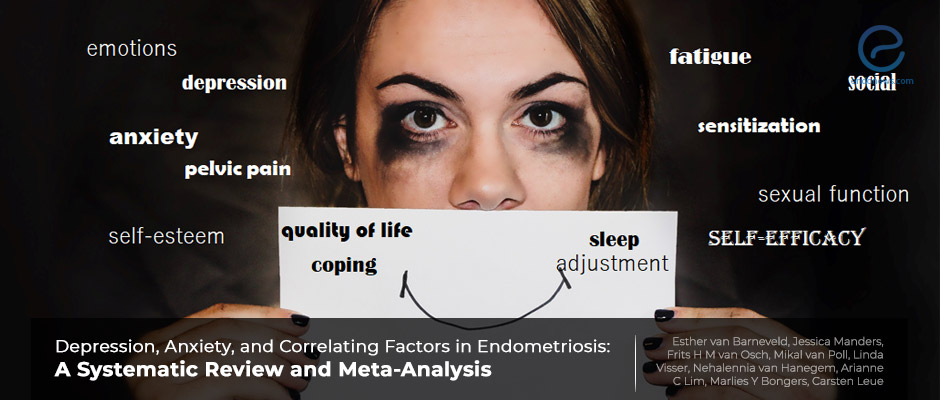Depression and Anxiety Common in Women with Endo
Sep 16, 2021
Screening is important among women with endometriosis to identify those who are most vulnerable to developing depression and anxiety.
Key Points
Highlights:
- Anxiety and depression are common among women with endometriosis likely due to the fact that they experience chronic pain.
Importance:
- The findings presented in this study support the importance of psychological and psychiatric screening among patients with endometriosis in order to identify those who are most vulnerable to developing depression and anxiety.
What's done here:
- Researchers conducted a systematic review of the literature and a meta-data analysis to explore the association between endometriosis, and depression and anxiety.
Key results:
- Women with endometriosis have significantly more symptoms of depression and anxiety than healthy women.
- There are no differences in terms of symptoms of depression and anxiety between women with endometriosis and women with other chronic pelvic pain conditions.
- Correlating factors between endometriosis and depression or anxiety include age, quality of life, quality of sleep, fatigue, sexual function, gastrointestinal symptoms, comorbidity, self-esteem, emotional self-efficacy, coping style, social adjustment, pain imagery, and pain sensitization.
Limitations:
- Only articles written in English were included in the study limiting the number of included studies.
- Most studies included women in tertiary referral centers leading to a risk of bias.
- The assessment tools were mostly self-assessment questionnaires, which does not provide a valid diagnosis.
- There was a large variation in the types of anxiety disorders pooled in the meta-analysis.
Lay Summary
Symptoms of depression and anxiety are frequent among women with endometriosis and are related to chronic pain, confirms a review of the literature and meta-analysis published in the Journal of Women's Health.
According to the study authors, correlating factors should be investigated further.
Researchers have suggested that the symptoms of endometriosis such as chronic pelvic pain are associated with psychological distress in women with the disease.
In order to explore the strength of the associations between endometriosis and depression or anxiety, a team of researchers led by Dr. Carsten Leue conducted a literature search for studies about endometriosis, depression, and anxiety.
They identified 1,837 articles containing the above terms. They then selected the articles that described an association between endometriosis and depression or anxiety. They selected a total of 47 such articles among the 1,837 and performed a systematic qualitative review. Seventeen of these articles were eligible for a meta-analysis.
The results of the meta-analysis showed that women with endometriosis had significantly more symptoms of depression and anxiety than healthy women. However, there were no differences between women with endometriosis and those with other chronic pelvic pain conditions.
“Besides the effect of pain, other correlating factors included age, quality of life, quality of sleep, fatigue, sexual function, gastrointestinal symptoms, comorbidity, self-esteem, emotional self-efficacy, coping style, social adjustment, pain imagery, and pain sensitization,” the researchers wrote.
The authors concluded that their analysis supports the idea that anxiety and depression are common among women with endometriosis likely due to chronic pain.
Research Source: https://pubmed.ncbi.nlm.nih.gov/34077695/
anxiety depression pelvic pain quality of life sleep fatigue sexual function self-esteem emotional self-efficacy coping social adjustment sensitization

